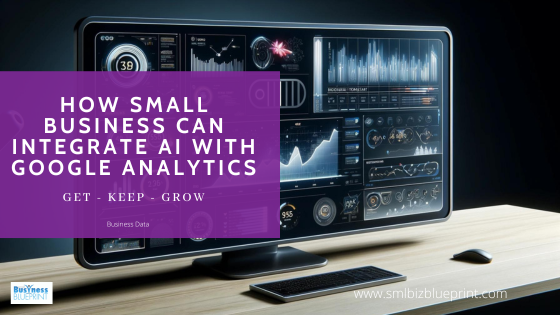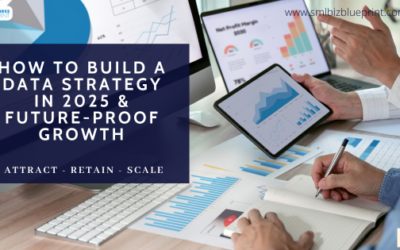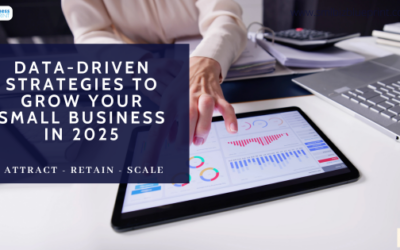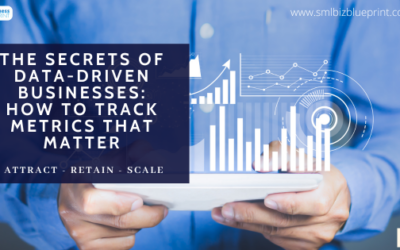In the ever-evolving digital marketing landscape, leveraging every tool is crucial for staying ahead.
For small businesses, Google Analytics is an indispensable resource for understanding website traffic and user behaviour.
But as the volume and complexity of data grow, simply using Google Analytics in its traditional form may no longer suffice. Enter Artificial Intelligence (AI)—your new partner in decoding complex data and transforming it into actionable insights.
This year, AI technologies have made significant strides, democratising advanced analytics that was once the domain of large corporations. Now, small businesses like yours can harness the power of AI in Google Analytics.
In this blog post, we will explore how AI can simplify the world of data and elevate your decision-making with precision and foresight.
From identifying the most relevant metrics and refining data accuracy to automating reports and forecasting future trends, AI is set to revolutionise how small businesses interact with Google Analytics.
Get ready to discover the essential AI tools and trends that will help you understand your analytics deeper and use them more effectively in 2024 and beyond.

#1 Introduction to AI and Google Analytics
In the digital age, data is ubiquitous, flowing in from interactions with customers across multiple channels and touchpoints. Google Analytics has long been the go-to tool for small businesses seeking to understand this data by tracking website traffic, user behaviour, and other metrics.
However, as the volume and variety of data continue to expand exponentially, the challenge isn’t just collecting it but making sense of it all. This is where Artificial Intelligence (AI) comes into play, offering powerful solutions to harness and interpret vast datasets more effectively.
The Role of AI in Google Analytics
AI enhances Google Analytics by automating complex data analysis processes, which allows for more accurate interpretations and faster decision-making.
For example, AI can quickly identify trends and patterns that might take humans hours or days to figure out, such as sudden changes in user behaviour or the impact of a new marketing strategy.
These capabilities make AI an invaluable ally for small businesses that must operate efficiently and stay competitive.
How AI Transforms Data Interpretation
One of the most significant advantages of integrating AI with Google Analytics is the ability to process large data sets without compromising speed or accuracy. AI algorithms are designed to learn from data iteratively, improving their accuracy over time as more data becomes available.
Small businesses can rely on AI to provide precise insights tailored to their needs.
Enhancing Decision-Making
With AI, Google Analytics becomes a proactive system that offers recommendations and predictions, not just a tool for monitoring metrics.
For instance, AI can analyse customer interaction data to predict which users will most likely convert, helping businesses focus their efforts and resources on the most promising prospects.
Additionally, AI can detect anomalies in traffic data that may indicate potential issues or opportunities, such as a sudden drop in visits to a popular product page.
By transforming raw data into intelligible, actionable insights, AI enables small businesses to make informed decisions quickly, a crucial advantage in today’s fast-paced market environment.
#2 Identifying Key Metrics with AI
Navigating the vast ocean of data that Google Analytics offers can be daunting, especially for small business owners who might not have specialised knowledge in data analysis.
The key to effectively leveraging this tool is collecting data and pinpointing the most impactful metrics that drive business decisions. This is where Artificial Intelligence (AI) steps in, simplifying the process by precisely identifying these critical data points.
Focusing on What Matters
AI’s capability to analyse large datasets allows it to identify which metrics are most relevant to your specific business goals. Whether increasing site traffic, improving conversion rates, or enhancing customer engagement, AI can determine the best metrics to track progress towards these objectives.
For example, if your goal is to enhance user engagement, AI might highlight metrics like session duration and pages per session as key indicators.
Customised Metric Identification
Every business is unique, and AI excels in customising its analysis to fit the specific needs of each enterprise. By learning from historical data, AI can forecast which metrics will be valuable based on past trends and current performance.
This tailored approach ensures that small businesses focus their efforts and resources on what truly contributes to their success.
Example
Consider a small online retailer that implements AI to analyse its Google Analytics data. The AI system identifies that while the retailer has focused on attracting new visitors, the key to increasing revenue is improving the conversion rate among existing visitors.
By shifting focus to optimising the checkout process and personalising offers, the retailer saw a 20% increase in conversions within a few months.
AI-Driven Alerts and Insights
Moreover, AI doesn’t just passively identify and report metrics; it actively monitors them and alerts business owners to significant changes or opportunities.
For instance, if there’s an unexpected spike in traffic from a specific source, AI can alert you to capitalise on this trend through targeted marketing efforts.
#3 AI Tools for Enhanced Data Accuracy
Accuracy in data collection and analysis is the cornerstone of effective decision-making. In Google Analytics, even minor inaccuracies can lead to misinformed strategies that cost time and resources.
AI tools are instrumental in enhancing the precision of data analytics, ensuring that small businesses can confidently rely on their data to make strategic decisions.
Improving Data Accuracy with AI
AI enhances Google Analytics’ accuracy by refining how data is collected, processed, and analysed. Tools like machine learning algorithms can detect and correct errors automatically, filter out spam, and distinguish between genuine user interactions and bots.
This capability is crucial for businesses that base their strategies on user behaviour and traffic sources.
Examples of AI Tools for Accuracy
Several AI tools are particularly effective for improving data accuracy in Google Analytics:
Predictive Analysis Tools: These tools use historical data to forecast future behaviour accurately, helping businesses prepare for upcoming trends.
Data Cleaning Tools: AI-driven tools automatically clean data by removing duplicates and correcting discrepancies, ensuring the data you analyse is current and correct.
Anomaly Detection Tools: These tools alert you to unusual data patterns that may indicate problems or opportunities, such as a sudden drop in traffic or an unexpected surge in a specific demographic.
Example
Consider a boutique marketing agency that leveraged AI tools to enhance the accuracy of its Google Analytics data. The AI tools helped identify inaccuracies in traffic source reporting, which previously led to inefficient ad spending. With more accurate data, the agency could reallocate its budget more effectively, resulting in a 35% increase in ROI from its marketing campaigns.
The Impact of Reliable Data
The ability to trust your data cannot be overstated. With AI-enhanced Google Analytics, small businesses gain not just insights but confidence in those insights.
This reliability translates into stronger, data-driven decisions that propel businesses forward in a competitive landscape.

#4 Predictive Analytics for Forecasting Traffic
Understanding future trends is as crucial as analysing the present. Predictive analytics, a facet of AI that uses data, statistical algorithms, and machine learning techniques to identify the likelihood of future outcomes based on historical data, is transforming how small businesses predict website traffic and user behaviour.
This forward-looking approach allows small businesses to anticipate changes and adapt strategies proactively.
The Power of Predictive Analytics
Predictive analytics can forecast traffic surges or declines, helping businesses prepare for opportunities and challenges. For example, by analysing patterns from past holiday seasons, a predictive model can estimate increases in traffic and guide businesses in optimising their websites and marketing campaigns for peak times.
Benefits of Traffic Forecasting
Resource Optimization: Allocating resources more efficiently by predicting busy periods can help ensure that businesses are fully staffed and stock levels are adjusted accordingly.
Marketing Strategy Enhancement: Tailoring marketing efforts to coincide with predicted traffic increases can maximise engagement and conversions.
Improved User Experience: Anticipating higher traffic periods and preparing the server infrastructure to handle the load prevents site crashes and slow loading times, enhancing the user experience.
Example
A local online bookstore used predictive analytics to forecast a significant rise in traffic during back-to-school seasons. By aligning their marketing campaigns with these predictions, they increased targeted advertising before the peak period, resulting in a 40% increase in sales compared to the previous year.
Implementing Predictive Analytics
To implement predictive analytics in Google Analytics, small businesses can start by integrating AI tools that analyse historical data trends. These tools can provide insights into user behaviour patterns, helping businesses forecast future actions and prepare adequately.
#5 Automating Reports with AI
In today’s fast-paced digital landscape, the ability to quickly access and interpret analytics data can be a game-changer for small businesses. Manual reporting processes are time-consuming and prone to errors, potentially leading to decisions based on outdated or incorrect information.
AI-driven automation in Google Analytics reporting transforms this crucial aspect by streamlining the process and ensuring data accuracy and timeliness.
Streamlining Reporting Processes
AI technologies can automate data extraction, formatting, and presentation from Google Analytics, allowing business owners to receive reports at predetermined intervals or on-demand with current data.
This automation saves valuable time and resources, freeing staff to focus on analysis rather than data collection.
Benefits of Automated Reporting
Consistency and Reliability: Automated reports are consistent in format, making them easier to analyse and track over time.
Real-time Data Access: AI systems can provide real-time updates, offering insights crucial for timely decision-making.
Error Reduction: Automation minimises human error in data handling, leading to more accurate business insights.
Example
A small e-commerce store implemented AI to automate its Google Analytics reporting and noticed a significant shift in operational efficiency. Previously, manual reporting took approximately 10 hours a week. Automation reduced the same task to less than an hour, with the added benefit of real-time data insights, allowing for quicker responses to market trends.
Setting Up Automated Reporting
To set up automated reporting, small businesses should:
Identify Key Metrics: Determine which metrics are most relevant to their goals.
Select the Right Tools: Choose AI tools that integrate well with Google Analytics and meet their reporting needs.
Customise Reports: Customize the settings to ensure that the reports generated meet the business’s specific needs, focusing on the most relevant data points.

#6 Optimizing Marketing Campaigns Using AI-Driven Insights
Staying ahead in the competitive digital marketing landscape means leveraging every tool to optimise your strategies. Artificial Intelligence (AI) integrated with Google Analytics provides small businesses with powerful insights that can dramatically improve the effectiveness of their marketing campaigns.
By analysing data in ways humans cannot match speed and accuracy, AI helps refine targeting, timing, and content to maximise return on investment (ROI).
Enhancing Campaign Effectiveness with AI
AI-driven analytics tools can dissect large volumes of data to identify patterns and preferences in customer behaviour. These insights enable businesses to tailor their marketing messages more effectively, targeting the right audience with the right message at the right time.
For example, AI can help identify which customer segments are most likely to respond to specific offers, which advertising channels generate the most valuable traffic, and what times of day yield the best engagement and conversion rates.
Personalisation at Scale
One of the most significant advantages of using AI in marketing campaigns is the ability to personalise at scale.
AI algorithms analyse individual user data to deliver personalised experiences, from customised email marketing messages to tailored website content, significantly enhancing customer engagement and satisfaction.
Example
Consider a boutique health and wellness store utilising AI-driven insights from Google Analytics to revamp its digital marketing strategy. By analysing user interaction data, the AI identified optimal times for email campaigns and the most effective content themes. As a result, the store saw a 50% increase in email open rates and a 30% increase in online sales over six months.
Implementing AI in Marketing Strategies
To effectively use AI in optimising marketing campaigns, small businesses should:
Integrate AI with Existing Tools: Ensure that AI tools are fully integrated with Google Analytics and other marketing platforms.
Focus on Data-Driven Decisions: Base all campaign adjustments on insights derived from AI analysis to ensure data-back decisions.
Continuously Monitor and Adjust: Use AI to monitor campaign performance and make real-time adjustments, taking advantage of AI’s ability to process and react quickly to new data.
Conclusion
As we’ve explored throughout this blog post, Artificial Intelligence (AI) is no longer just a futuristic concept but a practical tool that small businesses can leverage today to enhance their use of Google Analytics.
AI can transform data into deep insights, streamline operations, and significantly boost the effectiveness of marketing campaigns. Integrating AI with Google Analytics is a game-changer, providing small businesses with capabilities that were once available only to large corporations.
Summarising the Impact of AI on Google Analytics
AI enriches Google Analytics by automating data analysis, enhancing accuracy, predicting future trends, and personalising marketing efforts at scale.
Each of these applications saves valuable time and resources and increases the precision and effectiveness of business strategies. The ability to quickly adapt to market changes and consumer behaviour with AI-driven insights gives small businesses a competitive edge in a crowded marketplace.
Looking to the Future
The future of AI in Google Analytics looks promising, with ongoing advancements expected to introduce even more sophisticated tools. These developments will likely make insights even more accessible and actionable for businesses of all sizes.
As AI technology evolves, small businesses should stay informed and be ready to adopt new tools and techniques to remain competitive.
Encouragement to Embrace AI
For small business owners, the message is clear: embracing AI in Google Analytics is not just about keeping up with technology trends but about actively propelling your business forward.
By adopting AI, you are positioning your business to make smarter decisions, optimise operations, and engage customers more effectively.
As we look ahead, integrating AI with analytics tools will continue to be critical for business success. The businesses that will thrive are those that are reactive to changes and proactive in leveraging technology to foresee and shape future outcomes.
FAQs
Q1: What are the primary benefits of integrating AI with Google Analytics for small businesses?
A1: AI enhances Google Analytics by automating data analysis, increasing data accuracy, predicting future trends, and personalising marketing efforts. These benefits lead to more efficient operations, precise decision-making, and improved marketing ROI.
Q2: How does AI improve the accuracy of Google Analytics data?
A2: AI tools help refine data accuracy by automatically detecting and correcting errors, filtering out spam, and differentiating between bot and human traffic. This leads to more reliable data for making business decisions.
Q3: Can AI in Google Analytics predict future customer behaviour?
A3: AI utilises machine learning algorithms and historical data to predict future trends and customer behaviours. This capability allows businesses to anticipate market changes and adjust strategies accordingly.
Q4: What are some AI tools recommended for small businesses using Google Analytics?
A4: Some effective AI tools include predictive analytics software, data cleaning applications, and anomaly detection systems. These tools help streamline data analysis, enhance accuracy, and provide actionable insights.
Q5: How does AI automate the reporting process in Google Analytics?
A5: AI automates the reporting process by setting up custom dashboards that update in real time, providing consistent and timely insights. This automation saves time and reduces the potential for human error.
Q6: Is AI difficult for small businesses to implement in Google Analytics?
A6: While AI integration may seem daunting, many user-friendly tools and platforms are designed for small businesses. These tools often come with support and tutorials to assist with setup and maintenance.
Q7: How can small businesses get started with AI in Google Analytics?
A7: Start by identifying your specific needs and challenges with Google Analytics. Then, explore AI tools that address these areas, focusing on those that offer scalability, ease of integration, and strong customer support.
Other Reading
Boost Your Small Business: Adapting Content Strategy for AI-Powered Search Engines
How Small Businesses Can Use AI in Content Creation
How Micro-conversions Help Small Businesses Refine Marketing Strategies




